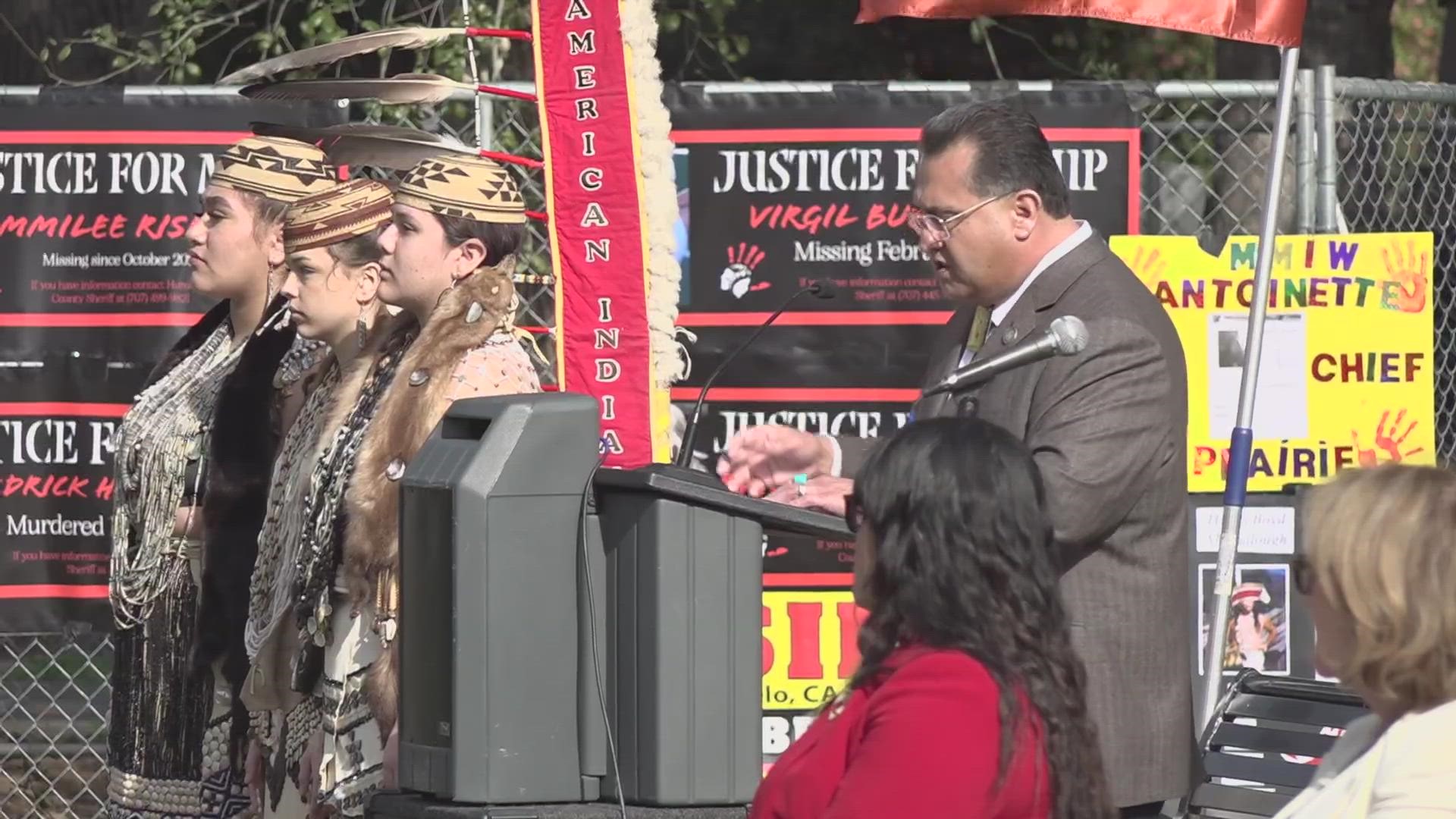SACRAMENTO, Calif. — Tuesday marked California's first-ever "Missing and Murdered Indigenous People Day of Action" led by the Yurok Tribe.
Tribal and other Indigenous leaders, and their allies, are working to raise awareness about MMIP.
That’s the epidemic where far too many Native Americans disappear or get killed and their cases go under-reported and unsolved.
“This is a big step forward in the state of California, as far as telling the story about Missing and Murdered Indigenous Women, Indigenous Persons that has been happening in Indian Country for many years when I was growing up," said Assemblymember James Ramos, California Native American Legislative Caucus Chair. "But now it's risen to the level of getting awareness and gaining allies.”
Ramos has been working to pass solutions to the Missing and Murdered Indigenous People crisis, including a “Feather Alert” system that was signed into law last year.
“When someone goes missing from a Federal Indian Reservation, tribal community, in the State of California, that Feather Alert can be triggered throughout the state of California, working with the CHP and local authorities,” said Ramos.
During this Legislative session, Ramos is working to pass two more bills aimed at the MMIP crisis.
One is Assembly Bill 44 which would grant tribal law enforcement and courts access to the California Law Enforcement Telecommunications System – or CLETS.
"Right now, people are coming on to Federal Indian Reservations and we don't know the severity of who these people are, coming on," said Ramos. "If we knew that, we could curb some of these violent acts against women and persons on reservations altogether.”
He hopes that by passing this law and allowing more sharing of criminal history between law enforcement and tribal police. They can reduce violence against indigenous people.
Also at the event were victims and advocates calling for change. One of those making sure victims' voices and stories were heard was Morning Star Gali, project director with Restoring Justice For Indigenous Peoples.
"We are here seeking justice," said Gali. "These are our friends. These are our relatives... We understand that the justice system has not worked for us as native peoples. We are here to remember all of those that have gone missing, that have gone murdered. And we are here in support of the families, we are here to be those voices and to be that support for those family members."
California tribal leaders are calling for the state to invest $200 million into tribally-proposed solutions and programs that address the crisis of violence against Native people.
“There is a visibility and conversations that are happening in this moment that have not happened previously," said Gali. "And so, you know, having that strong leadership, having that advocacy, us being on the ground, you know, working to support in the ways that we do - it's all interconnected.”
Ramos is also working this legislative session to pass AB 273 (Protecting and Locating Foster Children Missing from Care), which “will require counties and courts to notify Tribes, key family members and attorneys when a child is missing from foster care,” according to a news release. “It will also require a judicial hearing when a child or non-minor dependent in foster care is missing, to ensure the child is located and returned to a safe and appropriate environment. Native children in the foster care system are disproportionately more at risk of becoming MMIP victims.”
California’s first-ever MMIP Day of Action this week stems from another inaugural event, hosted back in October by the Yurok Tribe: the Statewide Tribal Summit on MMIP. It “served as a catalyst to unite California’s tribal leaders, justice systems, MMIP survivors and Native American advocates around MMIP,” a news release said, adding that since then, tribal leaders from throughout the state have met on a monthly basis to address the MMIP crisis.
Asm. Ramos said he wants “California at the forefront in confronting this issue.”
Watch: Marlena Alva shares story of her sister's death, the Missing & Murdered Indigenous Women movement
According to a report released in 2018 by the Urban Indian Health Institute (UIHI), a division of the Seattle Indian Health Board, 506 cases of missing or murdered indigenous women and girls have been reported since 1943. The numbers reflect information from records requests and research of 71 U.S. cities, and it is likely an undercount, researchers say.
Meanwhile, in 2018, an Associated Press investigation found 633 Indigenous women made up 0.7% of open missing person cases despite being 0.4% of the U.S. population.



















